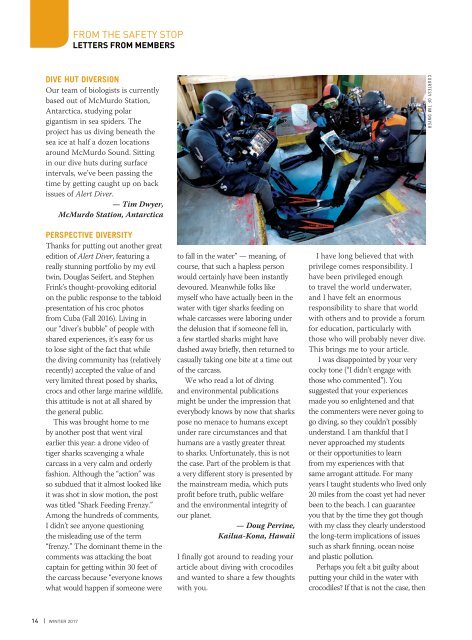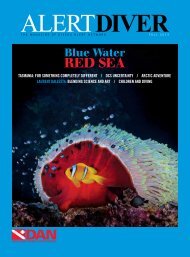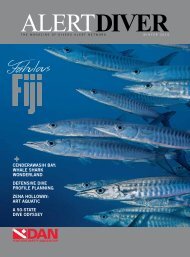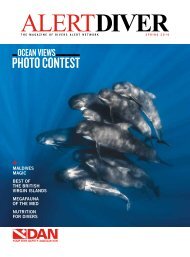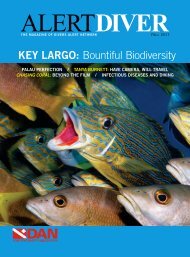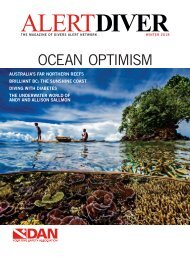AD 2017 Q1
Alert Diver is the dive industry’s leading publication. Featuring DAN’s core content of dive safety, research, education and medical information, each issue is a must-read reference, archived and shared by passionate scuba enthusiasts. In addition, Alert Diver showcases fascinating dive destinations and marine environmental topics through images from the world’s greatest underwater photographers and stories from the most experienced and eloquent dive journalists in the business.
Alert Diver is the dive industry’s leading publication. Featuring DAN’s core content of dive safety, research, education and medical information, each issue is a must-read reference, archived and shared by passionate scuba enthusiasts. In addition, Alert Diver showcases fascinating dive destinations and marine environmental topics through images from the world’s greatest underwater photographers and stories from the most experienced and eloquent dive journalists in the business.
Create successful ePaper yourself
Turn your PDF publications into a flip-book with our unique Google optimized e-Paper software.
FROM THE SAFETY STOP<br />
LETTERS FROM MEMBERS<br />
DIVE HUT DIVERSION<br />
Our team of biologists is currently<br />
based out of McMurdo Station,<br />
Antarctica, studying polar<br />
gigantism in sea spiders. The<br />
project has us diving beneath the<br />
sea ice at half a dozen locations<br />
around McMurdo Sound. Sitting<br />
in our dive huts during surface<br />
intervals, we’ve been passing the<br />
time by getting caught up on back<br />
issues of Alert Diver.<br />
— Tim Dwyer,<br />
McMurdo Station, Antarctica<br />
PERSPECTIVE DIVERSITY<br />
Thanks for putting out another great<br />
edition of Alert Diver, featuring a<br />
really stunning portfolio by my evil<br />
twin, Douglas Seifert, and Stephen<br />
Frink’s thought-provoking editorial<br />
on the public response to the tabloid<br />
presentation of his croc photos<br />
from Cuba (Fall 2016). Living in<br />
our “diver’s bubble” of people with<br />
shared experiences, it’s easy for us<br />
to lose sight of the fact that while<br />
the diving community has (relatively<br />
recently) accepted the value of and<br />
very limited threat posed by sharks,<br />
crocs and other large marine wildlife,<br />
this attitude is not at all shared by<br />
the general public.<br />
This was brought home to me<br />
by another post that went viral<br />
earlier this year: a drone video of<br />
tiger sharks scavenging a whale<br />
carcass in a very calm and orderly<br />
fashion. Although the “action” was<br />
so subdued that it almost looked like<br />
it was shot in slow motion, the post<br />
was titled “Shark Feeding Frenzy.”<br />
Among the hundreds of comments,<br />
I didn’t see anyone questioning<br />
the misleading use of the term<br />
“frenzy.” The dominant theme in the<br />
comments was attacking the boat<br />
captain for getting within 30 feet of<br />
the carcass because “everyone knows<br />
what would happen if someone were<br />
to fall in the water” — meaning, of<br />
course, that such a hapless person<br />
would certainly have been instantly<br />
devoured. Meanwhile folks like<br />
myself who have actually been in the<br />
water with tiger sharks feeding on<br />
whale carcasses were laboring under<br />
the delusion that if someone fell in,<br />
a few startled sharks might have<br />
dashed away briefly, then returned to<br />
casually taking one bite at a time out<br />
of the carcass.<br />
We who read a lot of diving<br />
and environmental publications<br />
might be under the impression that<br />
everybody knows by now that sharks<br />
pose no menace to humans except<br />
under rare circumstances and that<br />
humans are a vastly greater threat<br />
to sharks. Unfortunately, this is not<br />
the case. Part of the problem is that<br />
a very different story is presented by<br />
the mainstream media, which puts<br />
profit before truth, public welfare<br />
and the environmental integrity of<br />
our planet.<br />
— Doug Perrine,<br />
Kailua-Kona, Hawaii<br />
I finally got around to reading your<br />
article about diving with crocodiles<br />
and wanted to share a few thoughts<br />
with you.<br />
I have long believed that with<br />
privilege comes responsibility. I<br />
have been privileged enough<br />
to travel the world underwater,<br />
and I have felt an enormous<br />
responsibility to share that world<br />
with others and to provide a forum<br />
for education, particularly with<br />
those who will probably never dive.<br />
This brings me to your article.<br />
I was disappointed by your very<br />
cocky tone (“I didn’t engage with<br />
those who commented”). You<br />
suggested that your experiences<br />
made you so enlightened and that<br />
the commenters were never going to<br />
go diving, so they couldn’t possibly<br />
understand. I am thankful that I<br />
never approached my students<br />
or their opportunities to learn<br />
from my experiences with that<br />
same arrogant attitude. For many<br />
years I taught students who lived only<br />
20 miles from the coast yet had never<br />
been to the beach. I can guarantee<br />
you that by the time they got though<br />
with my class they clearly understood<br />
the long-term implications of issues<br />
such as shark finning, ocean noise<br />
and plastic pollution.<br />
Perhaps you felt a bit guilty about<br />
putting your child in the water with<br />
crocodiles? If that is not the case, then<br />
COURTESY OF TIM DWYER<br />
14 | WINTER <strong>2017</strong>


